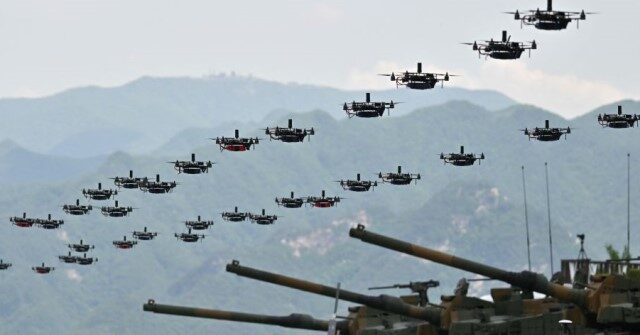North Korea has intensified tensions with South Korea, as reported by its state media on Monday, with claims that the military has been ordered to be ready to “open fire” along the border in response to perceived provocations. The situation stems from allegations made by Kim Yo-jong, the sister of North Korean leader Kim Jong-un, who stated that South Korea had sent a drone into North Korean territory, reaching Pyongyang, and hinted at the prospect of nuclear retaliation. Throughout the weekend, Kim Yo-jong issued a series of angry statements following the South Korean military’s denial of any involvement in the alleged drone intrusion. This verbal escalation marks a significant uptick in hostilities, with Kim employing aggressive rhetoric, suggesting implications for South Korea’s national security and sovereignty.
The accusations from North Korea come at a time when U.S. policy toward the Korean Peninsula has been perceived as unclear under President Joe Biden’s administration. In stark contrast to the previous administration’s focus on denuclearization, North Korea has taken a hardline stance against any negotiations, effectively outlawing denuclearization discussions while pushing for an increase in its nuclear arsenal. The situation has worsened with Kim Jong-un’s regime engaging in provocations that extended beyond mere threats. Recent activities included the release of balloons filled with trash across the border into South Korea, indicating a campaign of psychological warfare designed to instill fear and instability.
In reaction to these hostilities, the South Korean Joint Chiefs of Staff (JCS) ordered troops along the Demilitarized Zone (DMZ) to heightened alertness, emphasizing a state of readiness for any potential aggression from the North. South Korean officials responded firmly, reiterating their position that no drones had been sent to North Korea while contending that North Korea’s assertions of drone infiltration were unfounded. In this combative atmosphere, the JCS spokesman reassured that South Korea remains fully prepared for any threats, reflecting their commitment to national defense while acknowledging the potential for serious provocations from the North.
The war of words escalated as North Korea’s Foreign Ministry issued statements accusing South Korea of launching drone operations with the intention of spreading anti-DPRK propaganda. Kim Yo-jong’s rhetoric intensified further, threatening a “horrible disaster” if any South Korean drones were found again in North Korean airspace, and proclaiming that denial from South Korea signifies irresponsibility and a harbinger of potential doom for the country. This assertion of nuclear threats against South Korea indicates an alarming trend in North Korea’s approach, revealing the regime’s willingness to raise the risk of conflict, especially with escalating military postures on both sides.
Amid these tensions, South Korean officials adamantly refuted the claims made by North Korea, continuing to emphasize that they have no confirmed evidence linking them to the alleged drone incidents. Instead, they highlighted North Korea’s history of drone incursions across the South, suggesting hypocrisy on the part of Pyongyang for disregarding its own aggressive behavior while attacking South Korea for an alleged breach. The South Korean military intelligence noted that recent North Korean drone incursions underscore a pattern of violations that have historically embarrassed past administrations, complicating the current military and diplomatic landscape.
As both North Korea and South Korea engage in this ongoing verbal skirmish, the potential for conflict looms as regional stability falters under the weight of escalating military readiness and aggressive posturing. With South Korea firmly standing by its assertion of military preparedness while North Korea makes threats of nuclear consequences, the situation is precarious. Both nations remain entrenched in their positions, navigating a complex interplay of national pride, military might, and the looming shadow of nuclear capabilities, all while the international community watches closely for developments that could lead to conflict or, conversely, a renewed dialogue for peace.

